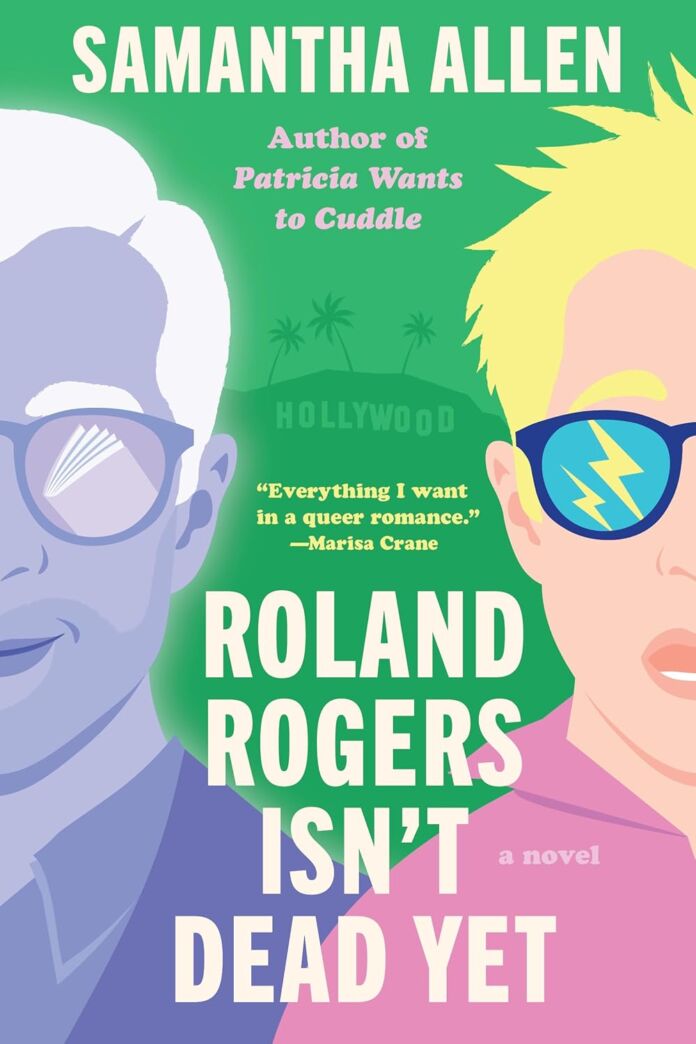In her sophomore novel Roland Rogers Isn’t Dead Yet, Samantha Allen crafts a story that is simultaneously a queer romance, a ghost story, and a meditation on authenticity in an age of carefully curated personas. Following the success of her debut novel Patricia Wants to Cuddle and her Lambda Literary Award finalist Real Queer America, Allen demonstrates her growing mastery of genre-bending fiction while maintaining her signature wit and insight into LGBTQ+ experiences.
A Story Unlike Any Other
The premise sounds like the setup for a joke: What happens when a struggling gay ex-Mormon ghostwriter meets an actual ghost who wants to write his memoir? But in Allen’s capable hands, this unlikely scenario transforms into a deeply moving exploration of connection, truth-telling, and the prices we pay for hiding our authentic selves.
Adam Gallagher, our protagonist, arrives at Roland Rogers’ Malibu mansion expecting to ghostwrite for Hollywood’s biggest action star. Instead, he finds himself collaborating with an actual ghost—Roland died in a skiing accident but remains tethered to his home through electrical appliances, determined to finally come out to the world through his memoir. What follows is a month-long dance between two men who can never physically touch, yet forge an intimacy that transcends the corporeal.
Masterful Character Development
Allen excels at creating complex, flawed characters who feel startlingly real—even when one of them isn’t. Roland Rogers may be dead, but he’s vibrantly alive on the page, his charm and vulnerability shining through every witty exchange. His journey from closeted action star to a spirit seeking redemption is handled with remarkable nuance.
Adam Gallagher’s character arc is equally compelling. A former Mormon whose coming-out memoir brought him brief fame before relegating him to obscurity, Adam’s struggles with impostor syndrome and self-worth resonate deeply. His past trauma around religious rejection and professional disappointment shapes his present in believable ways.
Writing Style and Execution
Allen’s prose sparkles with humor and heart. She navigates between comedy and pathos with remarkable dexterity, finding laugh-out-loud moments in the absurdity of their situation while never undermining the emotional stakes. Her dialogue crackles with authenticity, each character’s voice distinct and memorable.
Strengths:
- Innovative premise executed with conviction
- Deep emotional resonance
- Sharp, witty dialogue
- Thoughtful exploration of identity and authenticity
- Complex supporting characters, especially Zoya
- Beautiful balance of humor and heart
Areas for Improvement:
- The pacing occasionally lags in the middle sections
- Some readers may find the metaphysical rules governing Roland’s ghostly existence unclear
- The resolution of certain plot threads feels slightly rushed
Thematic Depth
The novel explores several interconnected themes with sophistication:
- Authenticity vs. Performance: Through Roland’s story, Allen examines how fame forces people to become performers in their own lives.
- The Weight of Secrets: Both protagonists grapple with the toll of hiding their true selves.
- Connection in the Digital Age: The unique dynamic between Adam and Roland serves as a metaphor for modern relationships mediated through technology.
- Religious Trauma and Healing: Adam’s Mormon background adds depth to discussions about identity and belonging.
Representation and Impact
Allen’s handling of queer themes is particularly noteworthy. Rather than presenting a simple coming-out narrative, she explores the complexities of living authentically in a world that often demands performance. The book’s treatment of religious trauma, body image issues, and internalized homophobia is nuanced and compassionate.
Technical Elements
The novel’s structure is clever, with the framing device of Roland’s memoir providing a backbone for the larger narrative. Allen’s management of timeline and pacing is generally strong, though there are moments where the story’s momentum briefly falters.
Audience Appeal
While marketed as a queer romance, Roland Rogers Isn’t Dead Yet will resonate with readers who enjoy:
- Literary fiction with supernatural elements
- Character-driven narratives
- Stories about writers and writing
- Explorations of fame and identity
- LGBTQ+ themes
- Unconventional love stories
Cultural Impact and Relevance
The novel arrives at a crucial moment in discussions about celebrity, authenticity, and representation in media. Its examination of how social media and fame impact identity feels particularly timely.
Final Verdict
Roland Rogers Isn’t Dead Yet is a satisfying read for its innovative premise, emotional depth, and skilled execution. While not perfect, it’s a remarkable achievement that pushes boundaries in both romance and literary fiction.
The novel will particularly appeal to fans of Casey McQuiston’s Red, White & Royal Blue and Ashley Poston’s The Dead Romantics, though Allen’s voice is distinctly her own. Like these works, it combines genre elements in fresh ways while maintaining emotional authenticity at its core.
Conclusion
Samantha Allen has created something truly special with Roland Rogers Isn’t Dead Yet—a ghost story that’s more about coming alive than being dead, a romance that questions what intimacy really means, and a meditation on the stories we tell others versus the ones we tell ourselves. Despite its supernatural elements, this is ultimately a deeply human story about the courage it takes to be truly seen.





